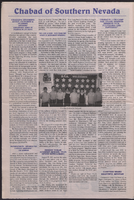Search the Special Collections and Archives Portal
Search Results
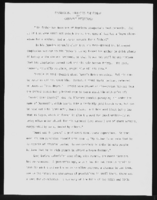
"Falsehoods, Fallacies and Fakery": article draft by Roosevelt Fitzgerald
Date
Archival Collection
Description
From the Roosevelt Fitzgerald Professional Papers (MS-01082) -- Drafts for the Las Vegas Sentinel Voice file. On Dumas, Tamarillo, and Afrocentric history curriculum.
Text
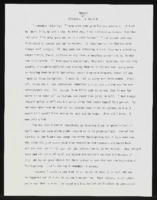
"Thanks": article draft by Roosevelt Fitzgerald
Date
Archival Collection
Description
From the Roosevelt Fitzgerald Professional Papers (MS-01082) -- Drafts for the Las Vegas Sentinel Voice file. On the Thanksgiving holiday.
Text
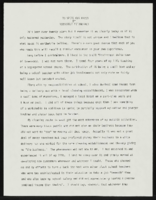
"To Spite Our Faces": article draft by Roosevelt Fitzgerald
Date
Archival Collection
Description
From the Roosevelt Fitzgerald Professional Papers (MS-01082) -- Drafts for the Las Vegas Sentinel Voice file. On the consequences of individual actions on others' votes.
Text

Stewart family real estate documents
Date
Archival Collection
Description
Stewart family real estate documents
Text
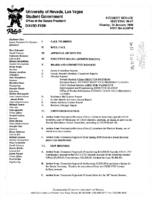
Meeting minutes for Consolidated Student Senate, University of Nevada, Las Vegas, January 24, 2000
Date
Archival Collection
Description
Text
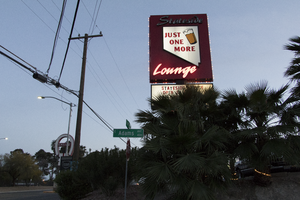
Photographs of Stateside Lounge sign, Las Vegas (Nev.), March 3, 2017
Date
Archival Collection
Description
Site address: 931 N Las Vegas Blvd
Sign owner: Laura and Doris Atchinson
Sign details: This bar opened up in 1996. They aim to be a place for people to have a cold drink and great food. It is a very popular hangout stop for baseball fans since it is within walking distance to Cashman Field. They are also known for their karaoke nights.
Sign condition: 4, the sign is still in pretty good condition. It just looks worn from weather and time.
Sign form: Roadside pole with a message center
Sign-specific description: This pole sign sits along Las Vegas Boulevard and is extremely visible for motorist and pedestrians. A black rectangular pole supports the two portions that make up this sign. The top portion is a wide rectangular shape and both sides of the sign have the same design on them. Each side has a red background with the word "Stateside" in white script open cabinet letters along the top of it. Under this is a plastic backlit sign in the shape of the state of Nevada. The words "JUST ONE MORE" in bold red text are in the in the middle of the Nevada sign as well as an illustration of a foamy glass of beer. Under this is the word "Lounge" in white script open cabinet letters. Surrounding the outside of this sign is a line of incandescent light bulbs that chase. Under this sign is a fairly large backlit message board.
Sign - type of display: Neon, backlit, incandescent
Sign - media: Steel and Plastic
Sign - non-neon treatments: Paint
Sign animation: Chasing
Notes: incandescent light bulbs
Sign environment: This bar sits very close to Cashman Field and is just north of the Cultural Corridor. It is down the street from the Las Vegas Library, the Las Vegas Natural History Museum, and the Neon Museum. It is also just down the road from Fremont Street.
Sign - thematic influences: Since the bar is called "Stateside Lounge," featuring the state of Nevada emphasizes the theme of the bar. Also, the illustration of the beer and the "Just One More" on the sign articulate that the property is a bar.
Sign - artistic significance: This sign is fairly minimal, but has a few striking details that make it unique compared to other bars throughout the city. Featuring the shape of the state of Nevada lets people know that this sign is a nod to the bar's home state. Also, the "Just One More" text in the center of the Nevada shape as well as the illustration of the beer make the property seem very welcoming and like somewhere you wound wants to spend time at.
Survey - research locations: Assessor's website
Survey - research notes: There is no specific date of any redesign; however, in earlier photographs the sign was originally blue with a red pole instead of being red with a black pole.
Survey - other remarks: https://www.reviewjournal.com/sports/sports-columns/ron- kantowski/51s-fans- dont-feel- likealiens-at- stateside-lounge/ https://www.yelp.com/biz/stateside-lounge- las-vegas
Surveyor: Lauren Vaccaro
Survey - date completed: 2017-09-10
Sign keywords: Neon; Incandescent; Backlit; Steel; Plastic; Paint; Chasing; Roadside; Pole sign
Mixed Content
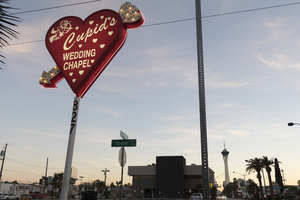
Photographs of Cupid's Wedding Chapel signs, Las Vegas (Nev.), March 13, 2017
Date
Archival Collection
Description
Site address: 827 S Las Vegas Blvd
Sign owner: Bellevue Holdings
Sign details: The original construction of this building was in 1950. This chapel is known for their weddings with Elvis Presley, James Brown and Johnny Cash impersonators.
Sign condition: 5- The sign is in very good condition with bright colored graphics with little/no fading
Sign form: Pylon
Sign-specific description: This sign has a white steel beam as its base. The shape of their sign is a red heart with a white arrow going through it. The red heart portion of the sign has a red steel sign box within this is a back lit red plastic sign with white font on it. Surrounding this sign is exterior skeletal neon that illuminates red at night time. The font on their sign states "Cupid's Wedding Chapel" with the word Cupid in a bubble cursive font and the "Wedding Chapel" portion in a white block font. Surrounding these letters are white hearts as well as an image of Cupid shooting a love arrow. The white arrow that shoots through the heart sign showcases flashing incandescent light bulbs.
Sign - type of display: Neon, incandescent and plastic backlit sign
Sign - media: Steel and plastic
Sign - non-neon treatments: Plastic backlit sign
Sign animation: Flasher for incandescent light bulbs
Sign environment: This location is a few blocks south of Fremont Street on Las Vegas Blvd. This chapel has other wedding chapels near it as well as the city courthouse and a few antique shops.
Sign - date of installation: This sign has been up since at least 2007.
Sign - thematic influences: The heart and arrow is symbolic to depict love and Cupid specifically, which helps showcase the theme and name of this location.
Sign - artistic significance: Chapels perpetuate Las Vegas as the Marriage capital of the world as well as maintaining their Neon Signs really pays tribute to Las Vegas' vintage culture.
Survey - research locations: Cupid's Chapel website http://www.cupidswedding.com/, Asessor's Page, Top 20 chapels in Vegas website https://www.gpsmycity.com/tours/top-20- vegas-wedding- chapels-1018.html , history channel website http://www.history.com/topics/valentines-day/history-of- valentines- day/pictures/valentines-day/cupids- wedding-chapel- in-las- vegas
Survey - research notes: The Cupid's Wedding Chapel sign was showcased on History. Com discussing Valentine's Day Weddings, and they gave the number that there were 2.2 million marriages in the U.S. in 2007 and 126,354 took place in Nevada. http://www.history.com/topics/valentines-day/history-of- valentines- day/pictures/valentines-day/cupids- wedding-chapel- in-las- vegas
Survey - other remarks: They were ranked 5 on the top 20 chapels to get married at here in Vegas. https://www.gpsmycity.com/tours/top-20- vegas-wedding- chapels-1018.html
Surveyor: Emily Fellmer
Survey - date completed: 2017-09-09
Sign keywords: Steel; Plastic; Backlit; Incandescent; Flashing; Neon; Pole sign
Mixed Content

Transcript of interview with Vincent "Vince" Hart by Andrew Bannister, February 21, 1980
Date
Archival Collection
Description
On February 21, 1980, Andrew Bannister interviewed Vincent “Vince” Hart (born on July 7, 1945 in Jerusalem, Palestine) in Hart’s office about his experience with youth soccer, both as a coach and as a player. Hart discusses his family background and his residential history in the United Kingdom and the United States before explaining the development of the men’s soccer team at the University of Nevada, Las Vegas. He describes his impact on the program and his hopes for future student athletes. The two then delve into a discussion of the fundamentals of soccer and different strategies that are commonly used. They then conclude with a brief description of Vince’s experiences with meeting a variety of professional soccer players at the Las Vegas Stadium.
Text

Alan Stock oral history interview: transcript
Date
Archival Collection
Description
Oral history interview with Alan Stock conducted by Barbara Tabach on December 27, 2017 for the Remembering 1 October Oral History Project. In this interview, Alan Stock discusses moving to Las Vegas, Nevada in 1999 for his job as a radio talk show host for KXNT. Stock describes the broadcast that covered the October 1, 2017 Las Vegas mass shooting from 11 PM on that night until 9 AM the next morning. He talks about some of the calls the station received from various members of the community, including survivors of the shooting, families of those at the event, people on lockdown in the nearby hotels, doctors, and general listeners. Stock describes some of the topics discussed on the broadcast, such as what was currently happening on the Las Vegas Strip, stories of the aftermath, and the support needed from the general public. Other topics include gun control and conspiracy theories. He discusses the impact this and other shootings would have on public affairs, including tighter security in daily living and public gatherings. He compares security in the United States to security in Israel and other countries, focusing on the idea of unconcealed guns worn in public. Throughout this interview, Alan Stock explains that the radio station's goal was to provide accurate information to the public during the aftermath of the October 1, 2017 mass shooting.
Text

